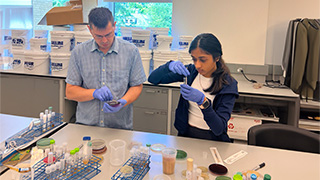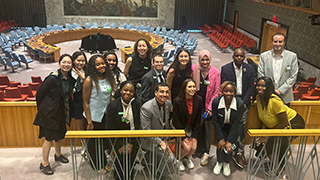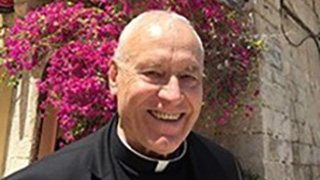Erik Hill and Biology Student Aastha Patel Awarded STEM Undergraduate Research Award
Thursday, June 6, 2024

Erik Hill, Ph.D., and Aastha working in the lab.
Assistant Professor of Biology, Erik Hill, Ph.D., and Biology Major Aastha Patel were awarded a new, competitive STEM Undergraduate Research Award for their research that analyzes the "Microbial Bacteria in Soil Samples to Determine Antibacterial Resistance." Trillions of bacteria can be found in a teaspoon of soil, often fighting over few available resources. Antibiotics are just one weapon these soil bacteria have developed to win this resource battle. Because antibacterial properties can be found in soil bacteria, Aastha has gathered soil samples from her community and started analyzing the soil bacteria inside to see if they have antibacterial properties against strains similar to known pathogens.
Once these soil bacteria samples are challenged against safe relatives of common pathogens, Hill and Aastha genetically and metabolically screen them to identify the different types of bacteria that are present in the soil. To identify these antibiotic properties, Hill and Aastha use an extraction method where an agar plate covered with a specific strain of interest was treated with ethyl acetate to solubilize the antibacterial compounds contained inside. This extraction method allows the scientists to isolate the antibacterial compounds from the soil colony. Currently, the pair is testing the raw extracts against the pathogens and is looking at the resistance systems these soil bacteria have against their own compounds.
Along with conducting regular screenings of more soil bacteria, Hill and Aastha plan on collaborating with chemistry professors Greg Weidman, Ph.D., and Nicholas Snow, Ph.D., to isolate and separate the raw extracts into specific antibiotic metabolites using chromatography analysis. The eventual plan is to identify how the original soil bacteria not only produced these antibiotic compounds, but also to discover why these same soil bacteria have immunity from their own antibiotics while similar strains do not.
After the conclusion of the experiments, Hill and Aastha hope to publish their findings and present at microbiology conferences as well as at next year’s Petersheim Academic Exposition. Throughout this process, Aastha has grown a deeper level of appreciation for microbiology under the guidance of Hill. Following her education at Seton Hall, Aastha aspires to pursue a career in medicine. Knowing that antibiotics can be found in something common like soil under our feet makes her excited to work with other microbiologists to find cures for diseases. She hopes to apply the techniques she is learning in Hill’s lab on a larger scale. Likewise, Hill applauds Aastha for "putting in the extra effort to achieve results." Mentoring undergraduate research was a driving force in Hill becoming a professor, and he is thankful to the College and the Office of the Provost for promoting undergraduate research over the summer with these awards.
Seton Hall has a robust Department of Biological Sciences with a wide range of faculty researching in microbiology, virology, immunology, and other related areas. The Department offers both master’s and doctoral degrees, and Seton Hall is excited to announce a new 3+2 B.S./ M.S. Program that will enable students to earn a B.S. in Biological Sciences and an M.S. in Molecular Bioscience in just five years. Students interested in STEM research should contact Associate Dean Mitra Feizabadi and students interested in STEM graduate programs should contact Associate Dean Michael Dooney.
Categories: Research, Science and Technology






